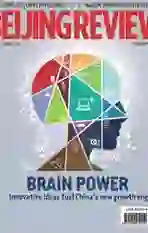HELLO, MUM!
2015-06-24ByJiJing
By+Ji+Jing
Traditionally, conceiving a child was mainly considered to be a womans job. But this hasnt discouraged two young men, who graduated from the largely male-dominated STEM hub of Beihang University in 2006. Liu Ting and Liu Hongtao have committed themselves to creating a device designed to help women get pregnant, this despite the fact that their respective majors are completely unrelated to the venture—one holds a masters degree in aircraft engine data processing and the other a masters degree in automation. At their alma mater, both men were known for their tech savvy and management skills.
The Eureka moment for their product came when Liu Ting and his wife experienced trouble when they decided to make a new addition to their family some years ago. Liu Tings wife found it difficult to determine what stage she was at in her ovulation cycle, as did the wives of Lius colleagues—most of whom, perhaps unsurprisingly, are male, as is the norm for tech companies worldwide. As they were to later find, many Chinese couples had exactly the same complaint. The rest, as they say, was history.
The innovative pair founded Aizhishang Technology Co. Ltd. in 2014, with Liu Ting acting as CEO while Liu Hongtao as CTO. They recently developed a tiny wearable device that may help crack the pregnancy code.
The device, which is about the size of a quarter, is attached to a cupless lace sports bra invented by the company and measures the basal body temperature of women preparing to conceive.
“The device tests and transmits the users temperature to a mobile app through Bluetooth,” said Liu Hongtao.
The app then compares a curve formed from measurements of the users basal body temperature with a standard curve that maps out the typical stages of the female ovulation cycle. “The app can automatically inform the user of her ovulation stage without having to go back to the old-fashioned way of measuring body temperature,” added Liu Hongtao.
“We branded the product Himama because it sounds as if a baby is calling his/her mother at a location neither too close nor too far away,”said Liu Ting.
To raise funds for further development and marketing, they turned to the crowdfunding platform JD Finance, a subsidiary of JD.com. Thus far, they have raised about 2 million yuan ($327,000) from netizens interested in their idea.
What makes the pairs accomplishments all the more impressive is that the abovementioned venture is not actually their first company!
Before starting his own company, Liu Hongtao worked with China Aerospace Science and Technology Corp. but found his job unfulfilling. Back in university as an undergraduate, he won first prize in the Feng Ru Cup, an annual competition related to scientific innovation at the university level. His winning invention controlled home appliances by using a mobile phone. Presented some 15 years ago, it anticipated the currently trendy Internet of Things. Since then, becoming an innovative entrepreneur has been his dream and an aspiration.
Like him, Liu Ting also held an enviable position with the Chinese Academy of Sciences, which he also quit in the pursuit of his dream.
The two founded Clesun Technology with five other graduates in 2007. The company sought to apply the Internet of Things to agriculture and winemaking. Liu Tings team later on invented a sensor able to measure the levels of temperature, humidity, carbon dioxide and light in greenhouses and the growth rate of microorganisms in breweries. “Since we can use sensors to monitor the growth of microor- ganisms, we thought why not apply the same sensor to humans?” he said.
During research and development, their company surveyed nearly 400 people on what functions they expected the device to possess and what kind of bra they wanted to attach the device to.
They have made multiple changes to the bra and the current version is the products 10th incarnation. To make the bra more comfortable to wear, they have hired an associate professor and designer from the Beijing Institute of Fashion Technology to oversee its design.
Numerous obstacles exist in growing a company. “Difficulties are omnipresent,” admitted Liu Ting.
